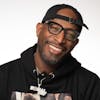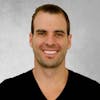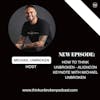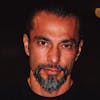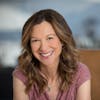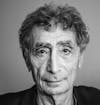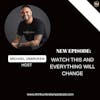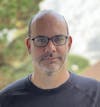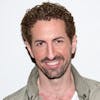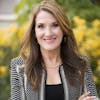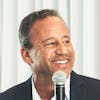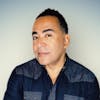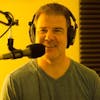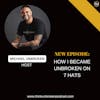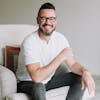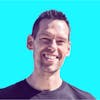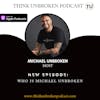Reneé Bergmen - How the Enneagram intersects Physical Health | Trauma Healing Podcast
Join our FREE COMMUNITY as a member of the Unbroken Nation: Join us for FREE, Unbroken Conference at: Make a real change in your health from the inside out. In this episode, I am joined by Renee Bergmen, a Functional Health Practitioner,...
See show notes at: https://www.thinkunbrokenpodcast.com/renee-bergmen-how-the-enneagram-intersects-physical-health-trauma-healing-podcast/#show-notes
Join our FREE COMMUNITY as a member of the Unbroken Nation: https://www.thinkunbrokenacademy.com/share/AEGok414shubQSzq?utm_source=manual
Join us for FREE, Unbroken Conference at: https://unbrokencon.com/
Make a real change in your health from the inside out.
In this episode, I am joined by Renee Bergmen, a Functional Health Practitioner, Gut Expert, Hormone Guru and Enneagram specialist. We talk about the impact of childhood trauma and abuse and the long-term detrimental health ramifications that come with growing up in cortisol toxicity, arguably the most important episode.
I believe that for those of you who will follow through in this entire episode, you're going to take away so much because not only is she brilliant as a doctor, but as a human being is one of the more intimate and vulnerable conversations that we've had on this show.
************* LINKS & RESOURCES *************
Learn how to heal and overcome childhood trauma, narcissistic abuse, ptsd, cptsd, higher ACE scores, anxiety, depression, and mental health issues and illness. Learn tools that therapists, trauma coaches, mindset leaders, neuroscientists, and researchers use to help people heal and recover from mental health problems. Discover real and practical advice and guidance for how to understand and overcome childhood trauma, abuse, and narc abuse mental trauma. Heal your body and mind, stop limiting beliefs, end self-sabotage, and become the HERO of your own story.
Download the first three chapters of the Award-Winning Book Think Unbroken: Understanding and Overcoming Childhood Trauma: https://book.thinkunbroken.com/
Join the Think Unbroken Trauma Transformation Course: https://coaching.thinkunbroken.com/
@Michael Unbroken: https://www.instagram.com/michaelunbroken/
Follow us on TikTok: https://www.tiktok.com/@michaelunbroken
Learn more at https://www.thinkunbrokenpodcast.com
Learn More About Renee Bergmen at: https://www.megaphonefunctionalhealth.com/
Support the Podcast: Become a listed sponsor!
Follow me on Instagram @MichaelUnbroken
Learn more about coaching at https://coaching.thinkunbroken.com
Get your FREE copy of my #1 Best-Selling Book Think Unbroken: https://book.thinkunbroken.com/
Michael: Hey! What's up, Unbroken Nation. Hope that you're doing well wherever you are in the world today. Very excited to be back with you with another episode with Renee Bergman, who is a functional health practitioner, gut expert, and Enneagram specialist. Renee, my friend. How are you? What is happening in your world today?
Renee: I'm doing great. I'm enjoying beautiful sunshine, it's real hot where I'm at. So just enjoying that wonderful heat.
Michael: I love it. Yeah. You know, sometimes I think to myself, if I could live somewhere where it's hot, every single day would make me very happy and then I've done it and I'm like, actually, you know what? I kinda like wearing hoodies, so I totally get it.
Renee: I agree. I go back and forth.
Michael: So, before we dive in and talk about all the amazing things that you do. And I particularly, I will just say this up front, this feels like a very self-serving conversation we're about to have, because I'm fascinated with what you do and I definitely want to go in the depths of it. And that said before we do so, tell everybody a little bit about your backstory, your journey and how you got to where you are today.
Renee: Yeah. You know, I think oftentimes people have a really long journey and mine is no different than that. I really flash back to being in my early twenties, so I'm in my forties. I was in my early twenties; I was mentoring a college student at the time and she told me that she had been sexually abused. She had never told anyone it; I was her safe space. She was really afraid to go to counseling and she asked me if I would walk through just the process of what that looked like to journey through that pain and explore it. So, I went to a counselor and said, can you help me, love this young girl and I began reading the wounded heart by Dan Allender with her. And flash forward I get to about halfway through the book and I find myself in the backseat of my car in a fetal position, sobbing uncontrol way. And upon reading the book, I had repressed memories that all came out, that I had been abused as a kid, and that I had totally pushed down. I'd been married for five years at this point had never identified as someone who had been abused, had never remembered any part of the story. And so, I was sitting outside of my husband's office, calling him in the backseat of the car and he was like what is happening? And that really was the beginning of this process of getting me to the point that I am here today. I went down a really long journey of unbelievably hard healing, lots of counseling, it unearthed really hard things in my marriage, it revealed so much insecurity that I had deep down inside that I used my personality to hide and it just revealed so much trauma in my body. So, then I hit like my mid-thirties and I was being diagnosed, I woke up one day, my face was super swollen and I had done a lot of work, a lot of physical work, I'd been down those roads. In my thirties I lost a child and it was one of the most devastating things in my life and so, my body just took on more trauma.
And about five years after that, I woke up one day and my face was the size like just can elope, it was huge. And my body was shutting down and I was being diagnosed with, beginning stages of lymphoma and I just bounced from doctor to doctor. There was a lot of confusion, Lymphoma's a really confusing cancer, it's an autoimmune disease, but it's also a cancer when you're in early stages, they don't treat you. And as I bounced from place to place, I finally landed in a functional medicine facility out here in Arizona. And one of the things that was really, so there was lots of testing that was done, that's a lot of what I do, a lot of the testing that I went back to school for. But one of the things that was really clear was that I had massive trauma in my life and my body held onto it. I know you and I talked a little bit about the body keeps the score and just Bessels work and how amazing he is. And I just, I see that time and time again, and that was my own story of just this deep-seated trauma that I had experienced from childhood and then losing a child, just so many different pieces that had happened and my body finally caught up and said I quit, and it spiraled. And so, I went through treatment and upon that treatment found all these crazy infections that I had going on in my body. I did even deeper diving of counseling, I did EMDR, I started really dealing with all the pieces of loss and abuse and trauma, and all of those things dealt with gut issues, dealt with the hormone stuff. And I can now say in my forties, I have more energy and I'm more just able to do life, to wake up and do everyday life than I ever was in my twenties. And I think so much of it came down to that, you know, deep-seated trauma that led my body to be open to lots of stress and cancer to form and infections and things like that. So, we went back to school and really wanted to help others because I saw what it did for me and in that process, it became, Enneagram trained and I went back for functional medicine. And started practice a couple years ago and really started diving in helping others to see there's such a mind, body, soul connection. You can't just say it's just physical, you can't just say it's emotional, you gotta deal with all of it because eventually it all kept catches up to you.
Michael: Yeah, truth. And that is such an incredible journey that you've been on. And I relate to so much of it and I want to go a little bit deeper into context here before we get into talking about your specialties, were again, I'm gonna be a little self-serving. And you're in your mid-twenties, you're reading this book, I think a lot of people and especially folks of the Unbroken Nation who are listening to this show are in the beginning phases of their journey or are at this place where they're starting to make meaning where they're like, fuck, all right, something bad happened, kind of trying to piece it together, what's going on. What became revealed to you through reading that book and that experience in your twenties?
Renee: So, I realized that I had been sexually abused by both my grandfather and my dad. And what the book really revealed is that sexual abuse doesn't always mean that someone had sex with you and that's such an important piece of healing that people feel like they're not worthy of saying that something happened to them if it wasn't the absolute intense worst thing that they've ever heard. There's something about victimhood that we feel like as a victim, it needs to be the worst thing for us to name it and to say it. And so, it took me years to even identify as someone who had been sexually abused because I just struggled that, well, mine wasn't this, or I hadn't been raped or something like that, which those were so horrific in my mind. But I had been physically touched in ways that were so inappropriate as a child. And it altered the way that I viewed myself, it altered the way that I interacted with people, it altered the way that I did relationship. I was so stunted in my sexuality because of it and I never understood why. And so, I think for people that are out there, first of all, I can't encourage you to read that book enough. I would say that anybody should read it because you, everybody knows someone that has had one of these experiences. When you read the book, you start to realize, how much people can take power away from you. And when that power is removed from you, it alters who you are, it alters your personality, it alters your DNA, it alters the way that you function within the world, which means that then it alters the way that the world impacts you. Right. And so, reading the book just really opened my eyes, it really made me have to do crazy amount of work that was really difficult. So, later I learned that I was a seven on the Enneagram, which sevens on the Enneagram hate hard stuff. They wanna fight it, they wanna push it away, they wanna do everything to do all the fun things to kind of squelch that. And that's who I became as an adult. I was always that really fun, loving, like life of the party, everybody wanted me their person and a lot of that was because I was hiding what was there. And so, I would just say to people that when you're first on the journey, be gentle to yourself, be gentle and it's okay to claim that someone has hurt you and not to compare it to someone else's journey because your journey is your own and everybody needs healing from the journeys they've been on. Everybody's experienced some level of trauma and they need healing. There's just varying degrees and when we start to compare, it makes us feel like we're not worthy of the healing. It makes us run away from the healing. It makes us feel like we shouldn't go to counseling. We shouldn't seek out EMDR. We shouldn't seek out support groups, all of those things. And once I finally gave in, my whole world changed when I finally was like, you know what, I'm gonna own this and I'm gonna go full force and I'm gonna tell anyone, I'm gonna keep, you know, being open and being willing to talk about it. Of course, after I did some of my own personal healing, not, you know, you don't wanna just like use that as a way of healing to just say it all the time. I did my own work with a counselor, I had a support group that I was in, things like that, but eventually to be able to name that as part of my story, just brought a lot of freedom, brought so much freedom.
Michael: Yeah. I totally resonate with that word. And you know, one of the things I think is really important for people to sit in is that some of these experiences, especially around sexual abuse is covert. It's not necessarily right there in your face, it took me, I don't know if you've ever read a book called the truth by Neil Strauss, but I was reading his book and coming to this realization that I had this like incestuous relationship with my mother because of actions when I was a child. And reading that this is why I love reading books because you'll have a holy shit moment and you'll go, oh, right, and that can be a really powerful thing because I was trying to understand how to get deeper into understanding who I am, my spirituality, my sexuality, myself as a human being and realizing like one of the biggest roadblocks to intimacy in my life and I don't just mean sex, I just mean intimacy with women was because I grew up in a covertly incestuous relationship with my mother. Right. And that's like a crazy fucking thing to wrap your head around, especially if that's the first time. And so, when you're in this and you're coming to this realization, you're in the back seat of this car having probably one of the worst moments of your life. I'll put words in your mouth. What was the first thing that you were thinking?
Renee: The first thing I was thinking was how am I gonna tell my husband? And I think because, you know, he was the person that I was most intimate with that I felt like I had shared everything with, we had been married for five years at this point, dated through college, college sweethearts and there was this like piece of me that this huge, huge piece of me that he had no idea had ever happened, and that was there and was he going to reject me? Was he going to think I was gross after I told him about this? Especially having two of the, like most key figures in your life, realizing that both of them had been inappropriate with you and not just inappropriate, abused you. And done it multiple times and repeatedly and that you had completely, like, was I a psychopath? Was he gonna view me as a psychopath? That I didn't remember this? Was he gonna think I lied? Were other people gonna think I was lying? What was my family gonna say? All those feelings just rushing of like, is this actually happening? Am I in a movie right now? That's how it felt. It felt like am I creating this. But physically, there was no way to push it away. It was like, it was so visceral, it's like that feeling of like vomit that comes up, that you have no control out of coming out of your body. If you get the stomach flu and it's coming up, it's all coming up, that's what it was, it was this emotional vomit that there was no, that physically was just taking hold of my entire. There was no getting rid of it, it was, I knew that it was so real, I knew that it was true, but I was so scared of what would happen. And of course, I mean, I've now been married almost 20 years, my husband has just enveloped me and walked with me through the healing and been my biggest supporter, been the one to just champion me seeking any kind of healing that I needed and then him seeking healing because of it, seeing that it, you know, how it impacted him and that he needed healing and that he had experiences in his life that weren't awesome. That's really what that moment was, that just unbelievable fear of what would happen.
Michael: Yeah. And I think a lot of people have that moment, especially when they recognize like, oh wait, maybe I've had this stuff done ‘cuz it's kind of like Pandora's box, right? You're totally fine one minute and then one minute later, everything about your entire life is different. Moving into like thinking in terms of like Bessel's work and your work and a lot of the things that I've discovered around health in this journey, where was your physical health at, in this timeframe? Because, you know, I think a lot of people have these traumatic experiences and they keep getting sick, they keep getting the flu, they can't eat certain foods, they're constant migraines and headaches and all these things they're not making meaning of. So, I'm curious, where was your physical health at, during this window?
Renee: Literally like two weeks before this happened, I had been in a doctor's office and they were saying, we're not sure if you have MS, we're not sure if you have lupus, I was having all these like, tingling, like numb sensations down my legs often. I just was sick all the time, I was getting strep throat constantly, and that was a lot of my childhood as well that I just got sick a lot. And there was just a lot of confusion, I had doctors saying, we think you have an autoimmune disease, but you will check off for like three of these things, but not all five. And so, they would like not diagnose and so, I just kind of move on. And that continued for a lot of years until I put those puzzle pieces together and began seeing how my physical health and my mental and spiritual and emotional health were tied. I struggled a lot, my gut was a mess like you said, foods; foods that I just couldn't handle, I would think, oh, I can't have barbecue sauce, something about barbecue sauce, like makes me itchy. I mean, stupid things like that, that I would be like, what the heck? And now I know they're not stupid, now I know that it's my, it was my body's way of really, like, it was internalizing all that stress and it has to go somewhere. Right. It's gotta go somewhere. And so, my body was just like shutting down.
Michael: Yeah. And as that was happening. You know, I remember a lot of times I was dealing with SIBO when I was about 27, 28, so small intestinal bacterial overdose. Yeah. And I probably believe that that was antibiotic induced because as a child, I must have been on antibiotics three times a year, strep throats, allergies, sickness, getting the flu all the time, not to mention on asthma, I had massive migraines as a child. Like I remember being a little kid and like putting that spray stuff under up my nose like weekly blinding, crippling, migraines, bedwetting, you name it just like, keep going, keep going, go. And I was just, I remember being like, fuck, I think everybody just gets sick all the time ‘cause my brothers were always sick all the time too. We were growing up in this incredibly traumatic household. I have an ACE score of 10, I know my brothers are six plus. And so, you think about it and you understand the research behind that, you look at the early onset, pulmonary embolisms, heart attacks, diabetes, cancers, that all stem from this toxic stress response. And I was in a doctor's office one time, this is like the 30th freaking doctor I had went to. Right. Trying to figure out why I am sick all the time. And he goes, I'll never forget this, you've seen all the doctors, you've done all the things, you know, we've done the MRIs and the cat scans, we've done the blood work, everything looks normal. This is psychosomatic and only in your head. And I was like, that's so fucking dismissive, dude, you can't tell me it's in my head. And so fast forward a little bit, I actually finally find a doctor who understands the research, who understands the impact of the somatic experience who understands our bodies and the way that trauma forces a lot of the negative ramifications of what your body does, growing up in a cortisol state. And she, within literally 35 seconds, she goes, oh, you have SIBO. And I was like, I don't know what that is, let's figure this out. Blah, blah, blah. Right. So, I think a lot of people and where I'm leading with this question is so many people are facing these illnesses and these ailments and they're trying all the things and they're taking 37 fucking vitamins and they don't know which way is up and they've tried all the diets and no matter what they do, they are still suffering, they are still trying to figure this thing out. From my own personal experience and having been down this path, it's disheartening. It's exhausting. It's time expensive, same as you you're in this. So, what I'm wondering is when you're now in your twenties, you're having these back and forth with these doctors, you're having these conversations, you're trying to figure out what's going on. What became the turning point?
Renee: Well, it wasn't until like my mid-thirties that I finally had someone do a similar thing to you. I had a doctor say, this is all in your head, this is psychosomatic, I had had a seizure, I'm like, you think I created this seizure? You think I faked it? And I finally, in my mid-thirties, when I was being told, I had lymphoma, I went to a functional medicine clinic and the doctor sitting across from me, number one said, I believe that you have an infection in your teeth, which no one had ever like talked about my teeth. I had had missing teeth as a child, it was like a hereditary thing, my dad didn't have a bunch of his permanent teeth. And so, I had all these implants in my mouth, he said, I think you have an infection in your teeth and I think you have so much deep-rooted trauma that your body doesn't know which way is up and so, all of your systems are failing. This is not just in your head; it is in the sense that your brain is overloaded with the amount of trauma that you've had and I just began weeping. I remember just like sobbing hysterically because he was saying all of these things that you've experienced have led to this, but there are real things that are happening in your body, there's real infection, there's real cancer, there's real gut dysfunction and hormones going awry. All of these things are real, but there's a reason that they're going on and it stems back to all this trauma and we've gotta deal with that alongside the physical. And it just felt finally felt like someone was listening to me. Someone was saying, I hear you. I see. I understand why this is where you're at and there's help, there's me and then there's other mental health professionals that really see it the same way that can help you and helped me find a great counselor. I had had some really good counselors at that point, but I finally found some counselors that were really on board with, seeing both worlds and how they converged together and the necessity to deal with both at the same time.
Michael: You know, it's fascinating to me how a large vast amount of this is psychosomatic. Right. Because I remember, you know, one of the things, I mean, there's both sides, right? There's the aspect in which no, you're actually sick like, yes, this is because of all the toxicity of your experiences of your life and then this other side of it, where it's like, you know, remember sitting EMDR one time and on the end of that experience, just filling like for the first-time anxiety had actually left my body and I had never had that experience. And so, I probably was 30 at that point and I just always had this racking anxiety, but I never wanted to take anxiety medication, because it always made me feel like fucking gross and numb. And on the backside of that experience, I remember just walking down the street for the first time, I didn't have like keys between my knuckles or a pocket knife in my hand, or, you know, whatever that thing might be and just being like, oh, maybe this is what it feels like to be a normal person for a moment. So, you're in this you're going through what is the pendulum swing here in terms of your health starting to actually change? Like, what are things you're actually doing? What are you executing against? What is the game plan look like? What were the symptoms that were presenting then in that moment versus when you started executing the game plan you'll get into?
Renee: So, in that moment, I was having major swelling in my face. Like I mean, like I just looked like I had lumps all over my face, I couldn't get outta bed, I was so exhausted, I just wanted to lay in bed all the time. My depression was like, just overtaking me, everything felt awful. I had suicidal thoughts, I knew I wanted to keep living cuz I had children and I had an amazing husband, but I thought I can't keep living, feeling like this. Every joint on my body hurt, I was once a runner in college, I couldn't even hardly walk around the block without it hurting, my hormones were just totally tanked, my sexual drive was just didn't even exist, it was like I had no hormones. And so, the game plan was EMDR, so I did some intensive EMDR, lots of therapy and then, I had a major surgery in my mouth to have the implants in my mouth removed, they found a ton of infection in there at the time. My husband and I were serving people who lived outside, who lived in our neighborhood, we were getting to know them while becoming friends with them, inviting them into our community. And a couple of them that we, you know, knew were safe and that we had had built relationship for a while, we had let them come shower at our house. And because my immune system was so shot, I picked up a terrible infection from one of them that when the doctors found it, they were like you don't have this, unless you live outside or you live in a third world country, like what have you been doing? I said, well, I have homeless people that shower in my house and he was like that'll do it. And so, it was a huge infection that was riddled, went all into my limb system and so, then I did high doses of vitamin C, therapy and a lot of gut restore. So, I had a bunch of gut infections and parasites, and so tons of herbs and different supplements to really help combat that, had candida going on, which is an overgrowth of yeast. So, we were fighting that off with diet, I changed my diet radically, I began eating all whole foods, I had to cut out gluten because I was diagnosed with celiac disease and I began really increasing the amount of vegetables that I ate and cut out drinking, I just began drinking tons of water, I just really started taking care of myself plus all of this stuff that the doctor was doing. The surgery in my mouth was key, having things in your mouth is it's something that I actually ask a lot of my clients because lots of people have infections in their mouth and they have no idea but that was a huge part of it.
And then really working on stress. He just kept saying to me, stress doesn't just go away, you have to learn to deal with it. You gotta learn breathing. And so, I started doing yoga really religiously, my spiritual practices really increased I began meditating a lot with God and feeling like prayer was something that was worthwhile again, sitting in silence, being alone, something that was really big with being someone that had been abused is being alone was really scary because being alone with my own thoughts was so overwhelming. But as I began to heal, being alone was such a key component for this extrovert to realize that you need alone time, you need to process your thoughts and have silence. So, that was a lot of what I did and that's what I continue to do. I have a sauna in my home, like I have a home sauna that I get into quite often, I eat really healthy. I still enjoy life, I still have birthday cake with my kids on their birthdays and I still celebrate, I just went to Mexico and had wonderful margaritas. So, I'm not in this world of like, Oh, you just get rid of anything that's bad and then you go in that direction, you know, cuz then you can go super crazy in that direction of don't ever eat anything that's bad for you and don't ever have an ounce of sugar or alcohol. Learning to live life balanced was like just such a huge part of the journey to celebrate when celebration was necessary to mourn when morning was necessary to be able to both joy and grief at the same time that it was okay for both of those to exist. Especially after losing my son, you know, I've barely touched on that, that was such a huge, huge, monumental part of my story that my body just like freaked out from because you lose something that was a part of you. And to be okay, that I could celebrate my children that were here and still grieve him, I know this is a long answer, but I think when you're really getting to the root of your health, and you're seeing the physical sides of like needing to go after the infections, you know, heal your gut, change your microbiome, increase your hormones, I started taking natural hormones to like boost that back up, all of those things were so necessary, but they wouldn't have fixed at all if I wasn't also dealing with the sadness and the stress. And I got off an antidepressant that I had been on for like 10 years, it was out of being forced, they thought that I had an allergy to it and it was terrible going off of it. But now I've gone seven years without antidepressants and it doesn't mean I don't have sad days, but I've learned how to really use, you know, food as medicine and supplementation and meditation. And I'm not anti-medication please hear me, especially when we've walked through some of the hard stuff that all of us have walked through. There is absolutely a time and a place for it, but I was being forced to go off of it so, I had to figure something out. I had to figure out how to survive without it, because I was being told I couldn't take it. And so, I'm really grateful that I've been able to stay off of it but if at any point I felt like it was necessary, I would absolutely seek someone out to find that help. So, I always wanna make that really clear cuz sometimes in the natural world, there's kind of this like battle between traditional medicine and natural medicine. And I think there can be a role, hugging of those two worlds and sometimes there's a necessity for both.
Michael: Yeah. And I love that you used the word necessity, ‘cuz that's the same thing I was thinking. Right. But there's also a point where like I also believe I'm like, you've been taking this for six years, eight years, 12 years, I don't think it's working. Right. And there's so much where that's not a part of the nomenclature of the conversation around it, it's like, get on this pill, take it for the rest of your life. And maybe your life will get better, but your symptoms will probably get worse. Right. I love so many of the things that you said, and there are a lot of the things that I've done in my life too and there's a really interesting thought process that I have around not being dogmatic about it because there were periods of times early on, especially 29, 30, 30, 31 years old, where I was like, No alcohol, no processed food, no sugar ever worked out seven times a week, blah, blah, blah, blah, blah. And I still do a lot of that stuff, but now it's in moderation because I realize it had just become so much of my identity, cuz I was willing to do anything it took to feel healthy. One of the things that I know that I'm sure that, you know, as well, that I want to enlighten listeners on is how important gut health is in this conversation. And so, I mean, between having gut dysbiosis happening, all the processed food in the world, knowing that so many of the medications we take both over the counter and pharmaceutical, are damaging our gut health from the way that we sleep to the things we consume, the whole thing top to bottom. I'd love if you would just explain the importance of gut health when it comes to the correlation of trauma.
Renee: Yeah. You know, I actually just was teaching on this yesterday about the gut brain access because our gut and our brain talks so much. Our gut in our brain are the two biggest portions of our body that communicate to the rest of the body, what it's supposed to do. And so, the gut, when we have what I would call a leaky gut, which many people know what that is, a leaky gut is where the lining of your mucosal lining of the stomach is incapable of receiving nutrients properly. And so, a lot of times it's what causes food sensitivities, because two big particles are lining instead of looking nice and tight it's supposed to look like this like little fingers all along, it looks all mangled and it looks inflamed. Then food goes through when it's not supposed to, you might have an overgrowth when that happens all of a sudden, things overgrow that are supposed to be there. So, we're supposed to have bacteria’s and different things in there that really support the gut. But when they overgrow, then they are susceptible to letting in parasite activity or worms which most of my clients are so grossed out when they hear that a lot of people have worms. It's really common. You can get lots of different things just from traveling in your area or going to restaurants, it doesn't mean you traveled internationally. When that happens the gut causes all these problems with digestion. Well, digestion is the key way that our body processes, what we need to be able to function throughout the day. Right. We eat all day long and eating is so key for our survival and if the gut is in dysfunction and dysbiosis is happening, then our digestion is super off. So, then our pooping is off and pooping is one of the number one way that we get rid of toxins and that we clear the body of what it doesn't need. And so, if that's not happening, then we are just an absolute mess, so many people come to me with that, we have to deal with that. Well, then we talk about all the things that are created in the gut that go to the brain, serotonin, dopamine, GABA, glutamate, all of those are neurotransmitters, which is just a fancy word for these chemicals that help our move, all of those things have to do with how we feel happy or calm or less anxious and they are created in the gut and supposed to go up to the brain, be communicated to the brain through the vagal nerve, through the central nervous system, through the end tear nervous system, these are all big words for like just pathways of those things going up to our brain. If that doesn't happen that's where depression comes in. So, many people that have depression, they have massive gut dysfunction, I shouldn't say so many people, anyone that has depression has major gut dysfunction because your gut is responsible for making all of those happy hormones and neurotransmitters.
And so, if those things are off, we feel terrible. And then you add in there's this thing called the vagal nerve. And the vagal nerve is something that runs from the base of our neck all the way down our body, touches every organ in our body, it's responsible for pulling us out of fight or flight and putting us into rest and digest, which our body needs to be into to be able to process all the nutrients that we need. But many of us exist in this fight or flight state all the time, especially if we've had trauma. And so, that vagal nerve is a huge transit system for gut things in the gut that need to go up to the brain, guess what if you're in fight or flight? It tells your body not right now, we're not gonna do that, we don't need to transit that. Well, that's a problem because then you're doing it all day every day if you're staying in that fight or flight. So, vagal nerve work is a huge component of the work that I do. I know that Michael, you've done a lot of that of really calming down that big nervous system. There's lots of really simple ways to do it, of like gargling of singing is actually one, which is like really amazing because I think there's something too, if you've ever, you know, explored any kind of spirituality singing together is such an emotional thing for people and something that feels so calming to people it's because it's simulating their vagal nerve. And then, you can also do different exercises of breathing and deep breath work and yoga work that really encourage all of that. So, you have to deal with a gut, you have to, you've gotta deal with a gut so that you can deal with the brain so that your whole body can begin to function appropriately.
Michael: Yeah. I love that because, you know, especially if you feel sick, if you feel off, you can't do anything, like life feels insurmountable, it feels like you're stuck, you're constantly in that. And you know, I think one of the most difficult aspects of like gut health is like reminding yourself that the eight seconds of mouth pleasure is not worth the eight hours of pain.
Renee: Yes. That's such a good statement. And I think there's so many competing things being thrown at us in our world about food and about how we look and all those things. And so, it's a really delicate balance, you know, it's something that food is something that was designed to fuel our bodies and so, if we view food as fuel, that's like a way that we have control over what we do throughout our day. And oftentimes we can feel so out of control, especially if we've had trauma and our body is not feeling good when you don't feel good the last thing you want is to eat a bunch of roasted carrots. You're like, you know, junk, I wanna eat a pizza and drink a diet Coke or a beer, that's what I want. And I'm not saying that those things are always bad, maybe the Dr. Pepper, but they're not always bad, but if you're constantly, if your body is always asking for that, because it's so depleted, it's reaching for those sugars and those carbohydrates, ‘cuz their dopamine hits that carbohydrate boost and that boost in your blood sugar, that spike of blood sugar, it's like this boost of dopamine and so, we keep going back to it. Well, if you take the control and say, I have control over how I feel with what I eat and put good things into your body, it really changes the way that you view your physical activity and you view your way of doing relationships. If your brain isn't foggy and you feel like you can actually get out of bed, that makes such a difference in your whole day. And so, viewing food as something that you have control in your life because oftentimes, we've just been told that we don't have control, especially in food areas, like it's controlling if someone tells you what to eat, you get to say what you get to eat, you're in charge of your life. You know? So, you get to say, Hey, I wanna put good things in this body. I wanna eat good proteins and good vegetables. And then when I go out with friends, I'm gonna celebrate too, because that brings happy feelings and emotions and hormones, but I'm not gonna do it every single night, there's that moderation. I think what you said was so good. Just really moderating and learning how to flow in and out of those worlds is so important for what we do.
Michael: Yeah. It really is. And you know, to be dismissive of your need to participate in life is dangerous because you'll find yourself again, stepping into this dogmatic approach and I just don't think that's living. And I do think that there's kind of this pivot that you have to make in your life to actually be willing to sit in the pain of what you've done to yourself because there is some point and especially around food, alcohol, smoking, sex, a lot of these things you have to go like, oh, I caused this chaos and then sit in it and fill it because when you do that, then you start to remind yourself like, okay, wait a second. I'm getting associated with those experience and those feelings as opposed to the numbing sensation of it all, right? You know, there was a period of time in my twenties. Now, look, I recognize that you don't get to 350 pounds by accident, but you know, in my twenties being 350 pounds, it was like I was drinking fucking milk every single day, eating chocolate cake, literally eating chocolate cake almost every day, consuming gummy bears, McDonald's three, four times a week, you know, and so, I used to be like, oh, I come from a big family, I'm big bone that's a Midwestern concept. And I came to found like, no, that's not true, dummy, what you're doing is you're poisoning yourself every day with McDonald's who's gonna sue me one day ‘cuz fuck them. And it was like, you know, you keep doing this, keep doing this, keep doing this. And one of the most incredible things that happened to me when I got deeper into therapy, I started getting cognizant of my life. I started making meaning of my experiences, meditation, yoga, journaling, I started paying attention to my body and how it felt because one of the biggest things that happens to people who survive trauma, is they disassociate ‘cause it's the safest thing that you can do to not be in your body is safety, it's avoidant of pain, of suffering of hurt. But then what you realize and this was my truth and what I realized, I was like, wait a second in the way that they used to hurt my body, I'm now hurting my body because it makes me feel significant. Now you cannot arrive at that place without doing a whole lot of fucking work. And so, now you're in this place, you're doing all the work, you're healing, you're getting better, I think that's a great transition. And you're starting to move into this idea of, okay, I wanna actually serve other people. What was happening in your life where you're like, okay, I'm gonna go help other people. I'm gonna go suffer through school again and step into this, like what was going on? And what was your experience and what did you learn about yourself in that process?
Renee: I learned that studying is really hard when you're an adult. But I learned that I loved learning at that point in my life. And that I finally felt like I had purpose around something that I wanted to do that really contributed to the world. And not that I hadn't contributed to the world at that point, I had children raising kids and raising children that are contributors to society and that have, you know, good values and things, that's a huge job. And so, I'm super grateful that I was able to do that, my kids to be home with my kids, but I hit this place of, I want to do something that is outward facing and that I can really help people. And so, going back to school, I learned so passionate about teaching to people and teaching people how to really find that healing and to really seek that out and to listen to them, hear their story, say, you are not crazy. I swear the amount of times I say to people you're not crazy because people say, I know this sounds insane that I feel this way. And I'm like, you are not crazy. This is normal. And so going to school while I was doing my functional medicine training. I really had learned a ton about the Enneagram and so, I went through the process of being Enneagram trained. And one of the reasons that I did that is because I knew so much about trauma and about needing to face your childhood and who you were and how that created you to be who you are today. And so, that's a big part. I wanted to use it in my practice. I really help people see; I use the Enneagram. I have people take a WEPPS test, which helps them understand what their core number is and then, you know, what other numbers, they kind of have some heights in and lows in. And to really understand, like how did you take in the world as a child? And how did that create you to be who you are today and how does that make you respond to others and to yourself? And so, it's this amazing tool if you've never looked at the Enneagram or done the Enneagram, it really is just there's nine numbers and it has the ability to help people kind of break down different ways that they function their core weaknesses, their core longings, their core desires and their core need. And so, when we do that, when we look at those things, because I'm not touting to be a counselor that's not what my training is in, but when we look at the Enneagram, it helps 'em to kind of get this picture of where they came from and understand childhood messages that how they interpreted their childhood, because you can all grow up in one household and one person says I didn't experience that. Isn't that such a weird part of childhood. And so, looking at the Enneagram, it helps you understand that everybody interprets the world differently. Everybody takes in what their experiences are differently and it creates kind of who you are as an adult and understanding that helps people in the practice then look at things that have happened in their past and how that's contributed to their physical health. So, like you were saying a lot of times, I will say to people when you eat, do you know what's happening to you? Do you pay attention to your eating or do you finish eating and you kind of couldn't tell someone what the food tasted like or where you were at when you had lunch or what you were doing. And there's like this key moment of helping them understand you're disassociating. Are you may be using food as something that like comforts and heals? Do you sit and eat alone foods that you would be embarrassed for others to see which all of us to some extents do that, right? That's kind of life, but are you doing it to like a great extent, like you were saying, are you using chocolate cake every day? Do you know why? Do you know what emotion you were having when you started doing that? And so, the Enneagram just has this amazing ability to help people go, whoa, I did not know that's how everybody else interacts with the world with me and how I interact with the world and helps them tie together those, you know, some of that mind, body, soul. And then I oftentimes refer people to let's find you a counselor, let's get you EMDR, especially if there's deeper things and let's join together, have a team around you, let's have a team around you that helps you look at the physical look at some of your Enneagram, but then also, you know, seek out some counseling and mental health healing.
Michael: Yeah. And I love what you said about team, because I preach this all the time to my community. It's like, great, you have me have as a coach, but you need a therapist and you need this guy over here and that girl over here, and you need all of these things because you're effectively rebuilding yourself, especially on the backside of trauma. And one of the most important aspects of that is recognizing like, at least for me in my experience, I was like, yeah, one person is not gonna solve this problem for me. So, one of the things I'm curious about from a functional standpoint, actually let's do two things please and I may have kind of glossed over this sometimes after remind myself that it's important to really break down things in ways that people can understand. First, can you define what a functional health practitioner actually is and does?
Renee: Yeah. So functional health means that we're going after root causes for why you feel bad. So, in a very broken-down way, we look for why is the gut not functioning well? So, we use functional labs, we use stool samples, urine samples, hair samples, to look at, you know, do you have pathogens that are going on in your gut? Do you have an imbalance of bacteria that's supposed to be in there and that's not supposed to be in there? Are your hormones out of whack? Do you have too much estrogen and not enough progesterone? If you're a male, do you have too much estrogen and not enough testosterone? And that's why you feel like you just can't like work out, you feel exhausted when you work out so, we look at hormones in that way. And we get to these root causes of why these things are happening and then we help correct them, so we come together as a team. So, it's not me, telling you, this is what you do, it's me saying, how can we work together? What are the things that you feel comfortable doing and that you want to do? And I'll give you my training and you tell me what feels like really life giving to you in that healing process ‘cuz it's a joint effort and we put together a protocol of how to change that we change eating, we change exercise which you would think that it's like that I'm typically adding exercise for people, a lot of times I'm taking some of the exercise away because their body is too stressed.
We talk a lot about how to have balance, how to use meditative practices to calm the vagal nerve. We talk a lot about like, how are you finding community that supports you and that can walk alongside you. So, it's this really holistic approach to a whole-body healing. So, the mind, the body and the soul are not disconnected, I know I've said that a million times, but you have to view them as one and that they're all inter intertwined with each other. And so, functional medicine really looks at that approach helps people to get to those root causes and then how do you climb out of that symptomatology.
Michael: Yeah, that's a great definition of it. One of the things, and I'm gonna create a preface here before I say it, is that people need to be willing to take control over their own health. One of the biggest problems that I felt my experience was in going back and through the rocky broken ship of American health and like actually going into these, you know, normal Western doctors and facilities is being an advocate for your own health is seemingly impossible. And I would frequently run into these scenarios in which I'd say, I'm going to do this, or I'm not going to do this. And them being like, oh, well, I'm a doctor, I have a degree, you should listen to me. So, I think it's really important to function in a space in which you're an advocate for your own health and do what you believe is the right thing to do, which now leads me into the intersection of the question that I wanted to preface with. When people are being an advocate for their own health, and they're going through this process and if they're anything like me, they'll find a tremendous amount of benefit in dealing with a functional health practitioner, as opposed to traditional Western medicine, what are some of the things that they should be asking? What kind of labs? What kind of tests? What kind of questions? How can they prepare themselves to go into this kind of conversation?
Renee: Yeah, I think they need to be prepared to be really honest about how they feel. I think that people feel, I think, modern medicine has asked us to boil things down very briefly because we have only 10 minutes with a doctor and so, we just have to be able to say, I have this symptom. So, first and foremost, when you sit down with any functional health practitioner that they have enough time and space to really hear what you're feeling, because oftentimes you need someone to listen to all the different things that are happening and for the functional health practitioner to look at you and say, these are the dots that I see connecting, and this is what I see needs to happen. And then you wanna make sure that they're gonna run functional labs. So, I think that there's great health coaches out there that, you know, just help people figure out how to exercise and eat well and those are important aspects of what I do. But labs help you test and not guess because oftentimes when we're really in the tank, so people that are coming with autoimmune diseases or they're in that realm of like, someone's trying to diagnose them, but they haven't gotten a diagnosis and they just feel like crap all the time.
It's super important to be able to test things, to know exactly what we're going after. So sometimes people will say, look, I've tried every diet, I've exercised all these different, you know, programs nothing's changing. And I'm like, yeah, that makes. So, we've got to look at hormones. We've got to look at your minerals and we've gotta look at the gut. Those are like the three absolute necessities. And then in functional medicine, there's all these other tests, there's like, oh, tests and different tests that look at, you know, blood serum and you can look at the thyroid and make sure the thyroid is functioning, so all the extras, but at the very basic, are they looking at your gut? Are they looking at your hormones and are they looking at your minerals? Because those are the three keys to even begin starting to have some physical healing. And then are they willing to listen to you of what you want your process to be? Because not everybody is the same. Like we just talked about the Enneagram really defines that, not everybody is a type A I'm gonna do all these things perfectly nd I wanna list. Not everyone wants to just like run super hard, some people need like more coaching than others do. Some people wanna just have a hands-off approach and be given, you know, the roadmap, you need someone that's willing to listen to what you actually need as the person coming to them as the person that's sick, so that you feel like you're in control. I think that that's an important aspect of it that you feel like you have control.
Michael: Yeah, I would agree. I think that's really everything. And a lot of this conversation, the whole underlying element of it is control and the willingness to go and take that for yourself because, you know, if you're not doing it, nobody's gonna do it for you and I think that's probably one of the more difficult facets of this conversation is like actually stepping into ownership of self and simultaneously like reconciling the truth that for many of us, it's the first time we've ever done it and it's okay, cuz it's gonna be fucking bumpy and ugly and you're gonna make mistakes and you're gonna fall back and like, that's just a part of it. But if you just keep going forward asking the right questions, getting the right support, eventually on a long enough timeline, your life is very different. I mean, you just pointed to it a few moments ago, you said at 40 years old, you feel healthier with more energy than you ever have in your life and it's through the willingness of going down this path that has led you here. Renee, this has been an amazing conversation before I ask you my last question, can you please tell everyone where they can find you?
Renee: Yes, megaphonefunctionalhealth.com. It's a great place to start, lots of information, there's things for you to download for free to learn about your gut. I give you a bunch of information to try on your own and then if you wanna have a conversation and share more about your journey and have someone listen, you can book a free consult there.
Michael: Brilliant. And of course, we'll put the links in the show notes for the unbroken nation. My last question for you, my friend, what does it mean to you to be unbroken?
Renee: It means telling the truth about yourself. I think when you truly are unbroken, you tell the truth about who you are and where you've been, and you're willing to invite others into that truth.
Michael: Brilliantly said thank you so much for being here, Renee. Unbroken Nation, thank you so much for listening.
Please like, subscribe, comment, share.
Tell a friend.
And Until Next Time.
My friends, Be Unbroken.
I'll see you.
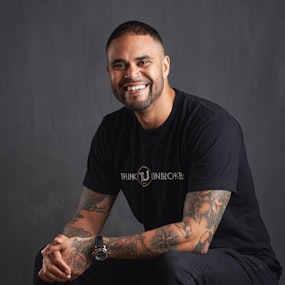
Michael Unbroken
Coach
Michael is an entrepreneur, best-selling author, speaker, coach, and advocate for adult survivors of childhood trauma.

Renee Bergmen
Functional Diagnostic Nutrition Practioner
Renee is a Functional Health Practitioner, Gut Expert, Hormone Guru and Enneagram specialist. She works as a health detective to help health conscious people who are frustrated with exhaustion, hormone disruptions and lack of clarity on their health challenges, uncover root causes to their pain. Through formulated food plans, Functional labs and Enneagram focused connection Renee’s clients get to root causes and gain back vitality. Renee has walked her own road of trauma and abuse that contributed to her body malfunction. But with the correct focus and changes she herself has gained incredible healing making her the most effective person to help you through your health journey!
Welcome to The Think Unbroken Podcast!
Here are some of my favorite recent guests!






















